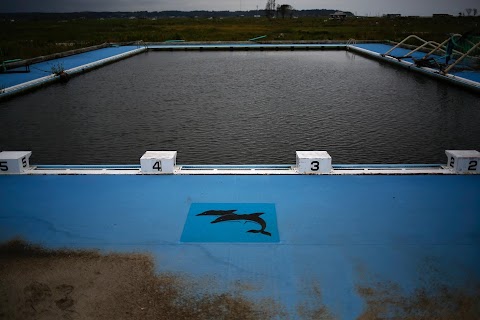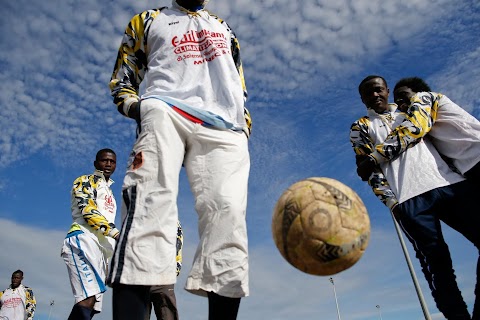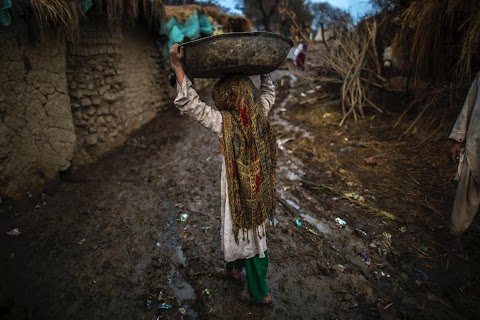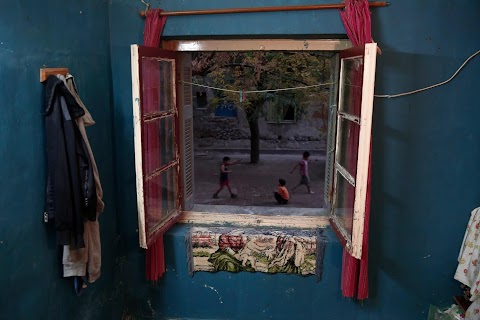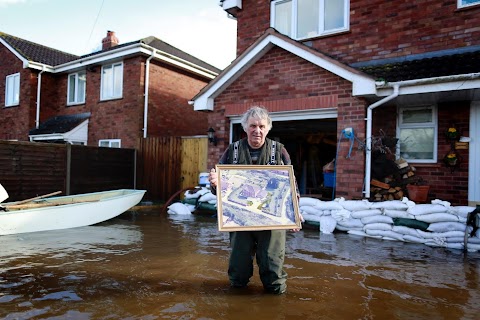
What would you save first?
 Cathal McNaughton
Cathal McNaughton
Thousands of people across England have fallen victim to the country's wettest January in nearly 250 years, with storms and floods damaging homes, businesses and transport links.
The southwestern village of Moorland is one of the places that have been hit. Reuters photographer Cathal McNaughton asked residents in the area what they would save first if the waters rise any further.

Water laps around Phil Vize’s legs as he carries his pet cat through his damaged home.
"I'm trying to save everything I can but there's just too much stuff, too many memories," he said.
Vize has moved what furniture would fit into the upstairs rooms of the house, which his wife's family have lived in for generations. His collection of vintage cars, however, already lies submerged outside.

Angela Greenway, a 40-year-old sales rep, poses for a photograph with her dogs. She says the animals are the first thing she would rescue if her house floods.
"Once the sentimentality was out of the way I wasn't bothered about my TV etc, I was only interested in my pets," said Greenway, who is co-coordinating the distribution of donated supplies from her house.
Slideshow

Jean Gibbons, a 64-year-old housewife, holds a USB stick containing family photos, which she says is the first thing she would rescue if her house floods.

Jean poses with her husband John outside their home in Moorland. John holds his passport, which he says is one of the first things he will save if the waters inundate their house.

Teaching assistant Claire Stanley, 40, poses with the photographs that she says are the first things she would save.

She holds up the photographs inside her home.

Carolyn Scriven, a 57-year-old retired police officer, poses outside her house with some of the photos that she says she will rescue first if her house floods.

Scriven holds up the photographs.

Margaret Avery, 71, and her husband Michael, 76, pose with their grandson Tom, 21, who suffers from Aspergers syndrome and epilepsy. If their house floods, they say they would focus on rescuing Tom.

Michael holds out an early picture of Tom inside their home.

Semi-retired Rickie Haughton poses inside his home with his English Mastiff, which he says he would rescue first.

Retiree Angela Tunstall poses with her husband Stephen, a company director, inside their house. Stephen holds one of the two dogs that are the first things they will take with them if their home is flooded.

Housewife and mother Lesley Haughton poses with her Daschund dog which she says she will rescue first.

Housewife Jane Clement and nuclear power station operations manager Paul Clement pose outside their home with one of the photographs they would rescue first if the waters rise.
"It’s not easy approaching people who are clearly going through such a difficult and life-changing time."
It’s like a scene from a Hollywood disaster movie. The Somerset village of Moorland is under five feet of water. Wading along the usually bustling main street, I am struck by how quiet it is – everything has an eerie, post-apocalyptic feel.
The only sound I can hear is coming from the now breached flood defences moving backwards and forwards in the ebb and flow of the rising waters, creaking like a sinking ship.
There is a strong chemical smell of leaking fuel as I push past the huge chunks of debris floating by in the murky waters. Cars lie abandoned with their lights left on, the houses are sandbagged and empty – their inhabitants left days ago. I see a deserted house with post still sticking out of the letterbox.
In the distance, I hear a faint rumble, which continues to grow until around the corner comes a large, ex-military amphibious vehicle. It’s the type of thing you might more usually see on fun city tours, which plunge into the river to the delight of the passengers. But here these vehicles are being used by amateur rescuers keen to do their bit.
It stops and I’m offered a lift through the village to the other side, where a few remaining villagers battle to keep the floods at bay. Others are simply hoping that the waters don’t rise any more. This is the case at the Vize family farm, where the living room is already under several inches of water. It starts to rain again.
It’s not easy approaching people who are clearly going through such a difficult and life-changing time. But as is mostly the case, I am left embarrassed and in awe of the hospitality and patience with which I’m greeted.
Sally Vize, 61, welcomes me into her house and, as if things were completely normal, immediately offers me a cup of coffee, which I gratefully accept. She then insists on making me sandwiches as we chat about the flooding. This would indeed seem relatively normal if the water weren’t lapping around our legs and the antique dining table wasn’t propped up on blocks of timber to keep it clear of the rising water.
After the sandwiches and another cup of coffee I take some pictures and leave. The sun is shining. By the end of the day I’ve been invited into several homes in my sodden chest waders and offered several cups of tea.
As I grab a lift back through the village on the military green monster, there’s a rumble of thunder and a flash of lighting. These people are really getting all the elements thrown at them, with many losing everything they have ever worked for. Their nightmare doesn’t look like it will be ending any time soon.







